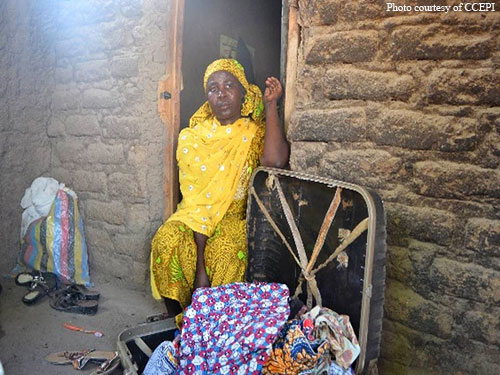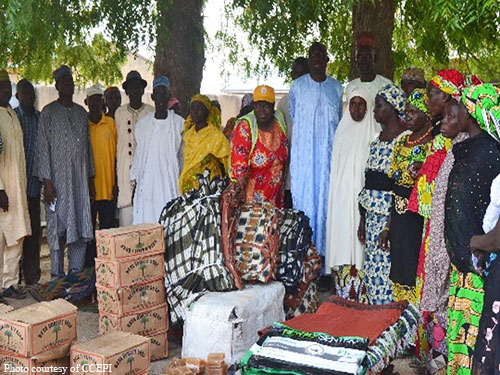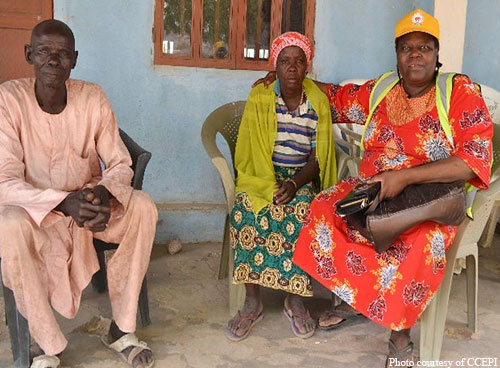By Rebecca Dali

A Chibok mother still waiting for her daughter. The suitcase is full of her daughter’s clothes and shoes, ready for her return.
The following report from a visit to Chibok is provided by Dr. Rebecca Dali, founder of CCEPI, the Center for Compassionate Empowerment and Peace Initiative–an NGO that has been providing care for Nigerians affected by violence including parents of the girls abducted from Chibok. Dali is the wife of EYN president Samuel Dali. Last week she met with parents and other family members of some of the abducted girls who are still missing, accompanied by other CCEPI staff and security personnel. CCEPI also took relief materials and letters of support from American Brethren to the Chibok parents:
“April 14 was a horrible day,” said Hanatu. “Boko Haram came around 12 midnight, forcing us at gun point to follow their orders. We cried, they battered us, we ran, they shot us, we begged them to spare our lives, they told us our lives are in their hands, we told them we are writing our exams, they told us that we do not need education. We cannot hide inside our rooms, because they set our school hostel ablaze.”
Chibok girls were forced to unknown destinations, where they had no freedom of religion, 95 percent of them were hindered from studying their Bible and singing praises unto Jesus Christ the Son of God, [forced] to reciting a foreign creed. They went from sleeping, cooking, and eating in secure homes to a place of ostracism where the future has been murky for a year.
My sixth visit to Chibok from April 8-10, 2015, was a very risky journey, but I decided to go and deliver letters from the Church of the Brethren congregations in America and express how brothers and sisters from the Church of the Brethren love, care, and have great concern for the abducted Chibok girls’ parents. A lot of people from other churches and other individuals’ hearts ache for them as well.
The aim of my visit was to make my observations about what is going on with the parents after losing their daughters for a year, as well as listening to their stories.

CCEPI delivers relief goods to Chibok families who lost daughters in the abduction of schoolgirls on April 14, 2014.
In Chibok I saw few parents of the abducted, mostly women and children and the elderly. The majority of the men are sleeping in the bush overnight. Few people are moving in the town, and the atmosphere is still tense. The men were security conscience because Chibok and surrounding villages have been constantly under attack by Boko Haram. Many parents of the abducted girls were killed and more than 400 other people were killed. Their houses and property worth millions of Naira, and worship places, were burnt. They look angry, confused, and fearful.
In Chibok, children are confined in their homes. I did not see many children on the streets of Chibok. I visited parents of the abducted girls, and there I saw children. They were not free, joyful, nor playful. In Chibok the children were sad, despairing, and sorrowful, still mourning their abducted sisters. Some of the children are not healthy, some were injured during the attack. One of the parents, Thlur, told me that one of her eight-year-old son’s limb was cut.
One of the parents, the mother of Naomi, sustained injuries and the Boko Haram cut her leg in Kwada village.
During my interviews I observed most of them are not getting enough nutritional food and lack basic things of life. Most of their health clinics were set ablaze, and there are no medical doctors, good medicines, or medical services. The Nigerian government is giving them some relief material but it is not enough to feed their families. They depend on humanitarian assistance but no NGO is aiding them–only CCEPI, which is not constant and is like a drop of water in a problem like a sea.
Pindar said, “My daughter Maimuna loved to study, she wanted to be a medical doctor. Whenever I was sick she took care of me, comforted me, and affirmed to me that when she becomes a doctor she will help. Now I am left alone suffering and mourning, no Maimuna, no food, no shelter, and nothing.”
Rachel told me that she sees no reason of staying alive without her daughter Deborah.
Hanatu, who lost two of her daughters–Ladi and Mary Paul–blames the Nigerian government for insecurity, corruption, and a lack of dignifying human beings. She wants her girls back immediately.
Riftatu is the only daughter to Yana, and she has been abducted. Both parents could not speak because of emotion.

EYN’s Rebecca Dali (at right) traveled to Chibok in April 2015 to meet with parents of girls who were abducted by Boko Haram one year earlier. Shown here, she comforts two of the Chibok parents.
I can go on and on. The odious stories are so much. More than 35 percent of the parents are no longer in Chibok. Some are in Internally Displaced Persons camps in Abuja, Maiduguri, etc. Some went to Kaduna, Lagos, Gombe, etc. to look for livelihood because in Chibok their farms have been destroyed. They will not go to farm because they are still surrounded by Boko Haram. They could not do business, since nothing is moving and the road leading to Chibok is very dangerous.
There was a heavy presence of military in Chibok, and we were stopped at checkpoints. There were a lot of vigilante groups, some members might not have reached 18 years. They barricaded the Government Girls Secondary School with no snapshots allowed near the sign boards and the gates are locked. Movement of persons and public gathering is restricted. We spent hours seeking permissions from the soldiers. They are skeptical of new faces. We heard sounds of heavy bombing and saw mounted armory. The Damboa Local Government was destroyed, it was just 30 minutes drive from Chibok. We spent the night in Damboa Army Camp because they told us it was not save to travel.
Destruction of infrastructure by the members of Boko Haram in villages surrounding Chibok affected houses, clinics, and school buildings. People made temporary roofs with thatch. Some are still building with mud. There is water scarcity.
CCEPI went with Nigerian Television Authority to anchor the visit, and a Swedish journalist took her own stories. All will be aired, and I hope the world will come to their aid. The parents have never heard anything about their daughters. The government keeps promising but up to now they did not hear anything.
There are a lot of stories from some who escaped from Boko Haram that they saw the Chibok girls. Some are saying maybe Boko Haram killed them while in Gwoza. We pray they are still alive and will be back soon.
Thank you Church of the Brethren members for your generous offerings. Without you CCEPI could not give relief and humanitarian assistance to Chibok. God bless each and every one of you.
— Rebecca Samuel Dali, Ph.D, is executive director of CCEPI, the Center for Compassionate Empowerment and Peace Initiative. CCEPI is one of the Nigerian NGOs that are working in the Nigeria Crisis Response along with Ekklesiyar Yan’uwa a Nigeria (EYN, the Church of the Brethren in Nigeria) and the Church of the Brethren.